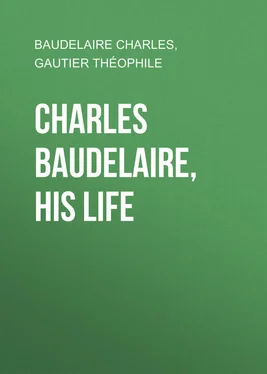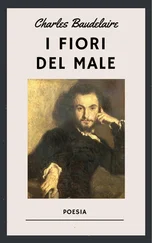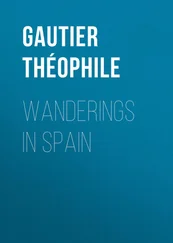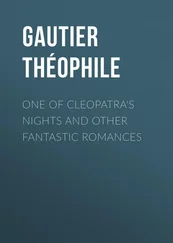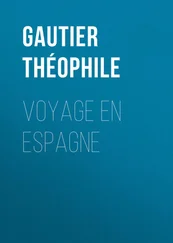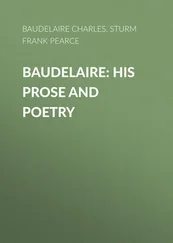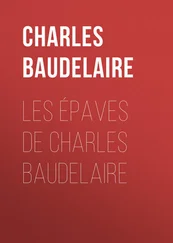Théophile Gautier - Charles Baudelaire, His Life
Здесь есть возможность читать онлайн «Théophile Gautier - Charles Baudelaire, His Life» — ознакомительный отрывок электронной книги совершенно бесплатно, а после прочтения отрывка купить полную версию. В некоторых случаях можно слушать аудио, скачать через торрент в формате fb2 и присутствует краткое содержание. Жанр: foreign_antique, foreign_prose, на английском языке. Описание произведения, (предисловие) а так же отзывы посетителей доступны на портале библиотеки ЛибКат.
- Название:Charles Baudelaire, His Life
- Автор:
- Жанр:
- Год:неизвестен
- ISBN:нет данных
- Рейтинг книги:4 / 5. Голосов: 1
-
Избранное:Добавить в избранное
- Отзывы:
-
Ваша оценка:
- 80
- 1
- 2
- 3
- 4
- 5
Charles Baudelaire, His Life: краткое содержание, описание и аннотация
Предлагаем к чтению аннотацию, описание, краткое содержание или предисловие (зависит от того, что написал сам автор книги «Charles Baudelaire, His Life»). Если вы не нашли необходимую информацию о книге — напишите в комментариях, мы постараемся отыскать её.
Charles Baudelaire, His Life — читать онлайн ознакомительный отрывок
Ниже представлен текст книги, разбитый по страницам. Система сохранения места последней прочитанной страницы, позволяет с удобством читать онлайн бесплатно книгу «Charles Baudelaire, His Life», без необходимости каждый раз заново искать на чём Вы остановились. Поставьте закладку, и сможете в любой момент перейти на страницу, на которой закончили чтение.
Интервал:
Закладка:
He watches the budding of evil instincts, the ignoble habits idly acquired in degradation. And, from this sight which attracts and repels him, he becomes incurably melancholy; for he thinks himself no better than others, and allows the pure arc of the heavens and the brilliancy of the stars to be veiled by impure mists.
With these ideas one can well understand that Baudelaire believed in the absolute self-government of Art, and that he would not admit that poetry should have any end outside itself, or any mission to fulfil other than that of exciting in the soul of the reader the sensation of supreme beauty – beauty in the absolute sense of the term. To this sensation he liked to add a certain effect of surprise, astonishment, and rarity. As much as possible he banished from poetry a too realistic imitation of eloquence, passion, and a too exact truth. As in statuary one does not mould forms directly after Nature, so he wished that, before entering the sphere of Art, each object should be subjected to a metamorphosis that would adapt it to this subtle medium, idealising it and abstracting it from trivial reality.
Such principles are apt to astonish us, when we read certain of the poems of Baudelaire in which horror seems to be sought like pleasure; but that we should not be deceived, this horror is always transfigured by character and effect, by a ray of Rembrandt, or a trait of Velasquez, who portrayed the race under sordid deformity. In stirring up in his cauldron all sorts of fantastically odd and enormous ingredients, Baudelaire can say, with the witches of Macbeth, "Fair is foul, and foul is fair." This sort of intentional ugliness is not, then, in contradiction to the supreme aim of Art; and the poems, such as the "Sept Vieillards" and the "Petits Vieilles," have snatched from the poetical Saint John who dreams in Patmos this phrase, which characterises so well the author of the "Flowers of Evil": "You have endowed the sky of Art with one knows not what macabre ray; you have created a new frisson ."
But it is, so to speak, only the shadow of the talent of Baudelaire, a shadow ardently fiery or coldly blue, which allows him to give the essential and luminous touch. There is a serenity in his nervous, febrile, and tormenting talent. On the highest summits he is tranquil: pacem summa tenent .
But, instead of writing of the poet's ideas, it would be infinitely better to allow him to speak for himself: "Poetry, little as one wishes to penetrate one's self, to question one's soul, to recall the memories of past enthusiasm, has no other end than itself; it cannot have any other, and no poem will be so great, so noble, so truly worthy of the name of poem, as that which is written purely from the pleasure of writing.
"I do not say that poetry does not ennoble tastes – be it well understood – that its final result is not to raise men above vulgar interests. This would be an obvious absurdity. I say that, if the poet has followed a moral aim, he has diminished his poetical power, and it would not be imprudent to lay a wager that his work will be bad. Poetry is unable, under pain of death or decay, to assimilate itself to morals or science.
"It has not Truth as an object; it has Itself. The demonstration of Truth is elsewhere.
"Truth has only to do with songs; all that gives charm and grace to a song will give to Truth its authority and power. Coldness, calmness, impassivity, drive back the diamonds and flowers of the Muse; they are absolutely in opposition to poetical humour.
"The Pure Intellect aspires to Truth, Taste informs us of Beauty, and Moral Sense teaches us Duty. It is true that the middle sense is intimately connected with the other two, and is only separated from the Moral Sense by very slight divergences, so that Aristotle has not hesitated to place some of its operations among the virtues themselves. Also, that which especially exasperates the man of Taste in the sight of Vice is its deformity and disproportion. Vice outrages justice and truth, revolts the Intellect and Conscience; but, like an outrage in harmony – a dissonance – it wounds more particularly certain poetical natures, and I do not believe it would be scandalous to consider all infraction of moral, the beautiful moral, as a fault against rhythm and universal prosody.
"It is this admirable, this immortal instinct of Beauty which makes us consider the earth and all its manifold forms, sounds, odours, sentiments, as a hint of, and correspondence to, Heaven. The insatiable thirst for that which is beyond and which veils life, is the most lively proof of our immortality. It is at once by and through poetry, by and through music, that the soul gets a glimpse of the splendours beyond the tomb. And, when an exquisite poem brings tears to the eyes, these tears are not the proof of an excess of joy, they are the witness rather of an excited melancholy, an intercession of the nerves, of a nature exiled in imperfection wishing to possess itself, even on this earth, of a revealed paradise.
"Thus, the principle of poetry is, strictly and simply, the Human Aspiration towards Supreme Beauty; and the manifestation of this principle is in the enthusiasm, the awakening of the soul, enthusiasm quite independent of that passion, which is the intoxication of the heart, and of that Truth, which is the Food of Reason. For passion is a natural thing, too natural even not to introduce a wounding note, discordant in the domain of un-sullied Beauty; too familiar and too violent not to degrade pure Desires, gracious Melancholies and noble Despairs, which inhabit the supernatural regions of Poetry."
Although few poets have a more spontaneously sparkling inspiration and originality than Baudelaire – doubtless through distaste for the false poetic style which affects to believe in the descent of a tongue of fire on the writer painfully rhyming a strophe – he pretended that the true author provoked, directed, and modified at will this mysterious power of literary production; and we find in a very curious piece which precedes the translation of Edgar Poe's celebrated poem "The Raven," the following lines, half ironical, half serious, in which Baudelaire's own opinion is set down under the guise of an analysis of the famous American author:
"The poetic principle, which makes the rules of poetry, is formulated, it is said, and modelled after the poems. Here is a poet who pretends that his poems have been composed according to technique or principle. He had certainly great genius and more inspiration than is general, if by inspiration one understands energy, intellectual enthusiasm, and the power of keeping all his faculties on the alert. He loved work more than anything else; he liked to repeat, he, the finished original, that originality is something needing apprenticeship, which does not necessarily mean to say that it is a thing to be transmitted by instruction. Chance and incomprehensibility were his two great enemies. Has he willingly diminished that faculty which was in him to take the most beautiful part? I should be inclined to think so; however, one must not forget that his genius, so ardent and agile, was passionately fond of analysis, combination, and calculation. One of his favourite axioms was the following: 'Everything in a poem as in a novel, everything in a sonnet as in a novelette, ought to contribute to the dénouement . A good writer has the last line already in his mind when he writes the first.'
"Owing to this admirable method the writer was able to begin even at the end, and work, when it pleased him, at whatever part he liked. Amateurs will perhaps sneer at these cynical maxims, but each can learn from them what he wishes. It would be useless to show them what Art has gained from deliberation, and to make clear to the world what exacting labour this object of luxury known as poetry really is. After all, a little charlatanry is permitted to genius. It is like the paint on the cheeks of a naturally beautiful woman, a new condition of the mind."
Читать дальшеИнтервал:
Закладка:
Похожие книги на «Charles Baudelaire, His Life»
Представляем Вашему вниманию похожие книги на «Charles Baudelaire, His Life» списком для выбора. Мы отобрали схожую по названию и смыслу литературу в надежде предоставить читателям больше вариантов отыскать новые, интересные, ещё непрочитанные произведения.
Обсуждение, отзывы о книге «Charles Baudelaire, His Life» и просто собственные мнения читателей. Оставьте ваши комментарии, напишите, что Вы думаете о произведении, его смысле или главных героях. Укажите что конкретно понравилось, а что нет, и почему Вы так считаете.
